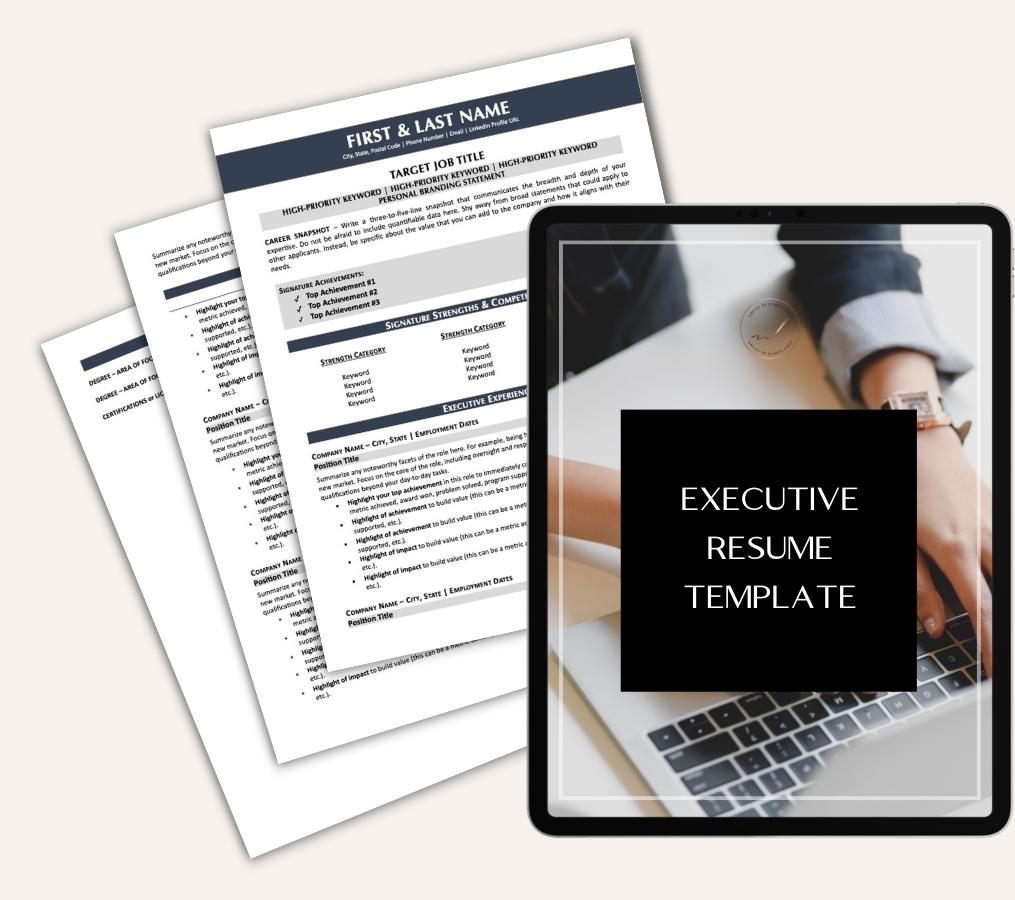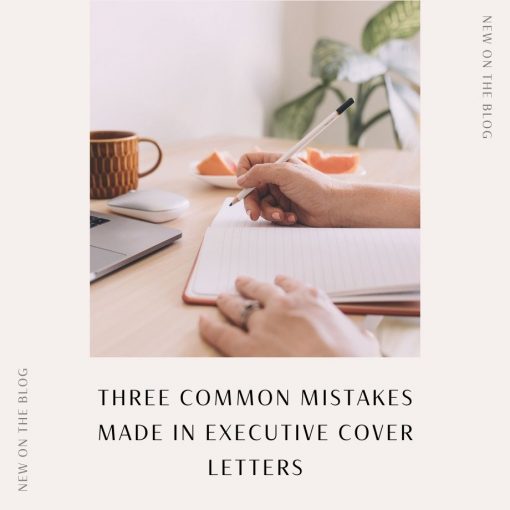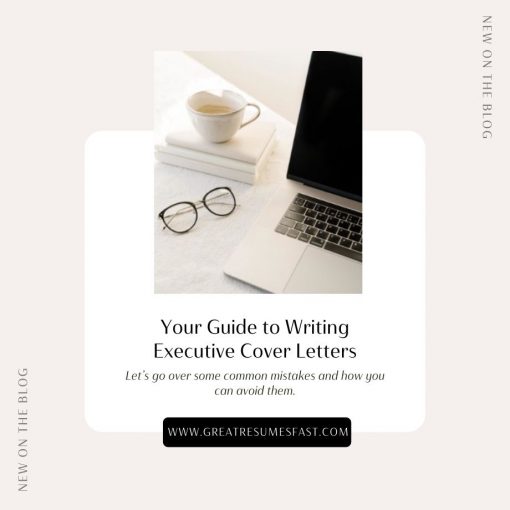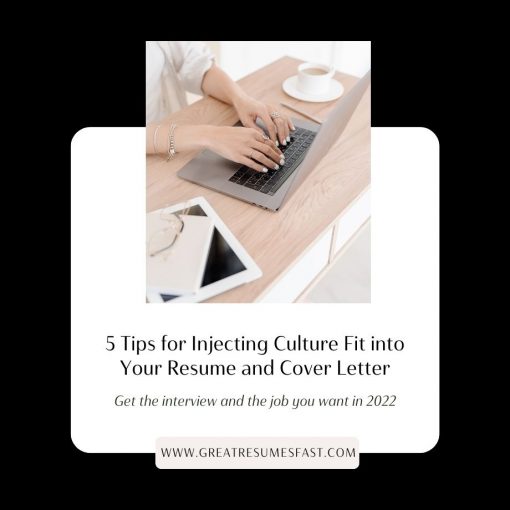What Should a Cover Letter Include?
Sitting down to write a cover letter is many job seekers’ least favorite activity. Knowing what to include and what the hiring manager will want to see isn’t always clear, especially with how much the job search landscape has changed just in the past year. So, what should a cover letter include?

In this article, I’m sharing the eight things a cover letter should include:
- The hiring manager’s name.
- A referral if you have one.
- The role you’re applying for.
- How your values align with the company’s.
- Accomplishments/results that hit on pain points.
- Why you want to make your next career move.
- Excitement about the opening.
- An ask for a meeting or chat.
Let’s dive in!
The Hiring Manager’s Name
Avoid using a general greeting like “To Whom It May Concern” or “Dear Hiring Manager” unless you absolutely have to use it. Before resorting to this, I encourage you to do a thorough search for the hiring manager’s name. This is much easier to do than in the past because you can use Google, check out the company website, or do a people and company search on LinkedIn.
LinkedIn will probably be the quickest and easiest way to find the hiring manager’s name. Simply locate the company on LinkedIn, click on the People tab, then search through by position title or keyword. You may want to start with a simple “HR” search and see what results you get.
It shows you did your homework when you can address the hiring manager by name. If Google, the company website, and LinkedIn come up empty you could always call the company and ask.
A Referral If You Have One
Did you know that referred candidates are twice as likely to get an interview and 40% more likely to be hired?
Instead of starting your cover letter with “I’m submitting my resume in response to the position of ________,” start your cover letter with the hiring manager’s name and follow it with “I was referred to you by _______.”
To begin your cover letter this way, you need a referral. If you’re actively engaging and networking, opportunities will come up to be referred. Always mention the referral in your cover letter, emails, and communication with hiring managers. A referral is a golden ticket to an interview and possibly even an offer.
If you need help working on networking, or networking your way to a referral, Austin Belcak of Cultivated Culture has a great article on how to network here.
Here are some more tips on how you can ditch the traditional cover letter and get more interviews here.
The Role You’re Applying For
In the introductory paragraph of the cover letter, state the exact position title that you are applying for. This clears up any confusion and lets the employer know what you want. If you’re writing a cover letter to a recruiter or to introduce yourself (more like a value proposition letter or letter of interest), then state the types of roles you’re seeking or your area of interest. Here’s an example,
I’m a senior executive focused on transition and change leadership.
It’s really important to state the role you want when you’re making a pivot or career transition. I recommend following it up with why you’re interested in a change and how your skills align with the transition.
How Your Values Align with the Company’s Values
A University of Michigan study found that sharing an alignment of values in a cover letter increased likeability, made a positive first impression, and resulted in more interviews.
Employers want you to state that you’ll fit in with their culture and values and why you’re a fit for their culture and values.
It requires some research to learn about the internal and company values of the organization, but you can find this information on the company’s website, social media pages, or by speaking with current and past employees. In fact, interviewing a current or past employee is a great way to determine if there’s a values alignment, how you might be a fit for the organization, and discover some pain points that you can address.
Share Accomplishments and Results That Speak to Pain Points
Speaking of pain points, take the time to research the problems your target company is facing and then in your cover letter give a couple of examples of how you’ve tackled similar challenges in the past and the results you’ve achieved.
I recommend adding three to five bullet points in the middle of the cover letter that speak to these pain points. Employers love to hire winners. They want to see how you’ve won in the past and how you can bring those same contributions to their organization.
Use a CAR format to write your accomplishments. If you’re not familiar with the CAR format, it stands for Challenge, Action, Result. You’re writing about a challenge you faced, the action you took to overcome the challenge, and the quantifiable/measurable results of your actions.
State Why You Want to Make Your Next Career Move
Oftentimes employers wonder why you’re interested in leaving your current company or why you left your last company. A simple one-line statement in your closing paragraph can answer this question and overcome any objections. An example of such a statement could sound like this:
While I have enjoyed my time with (company name), I have discovered that I prefer (type of company/size/etc.) where I can have a more direct impact on (area you want to focus).
It’s that simple!
Convey Your Excitement
This one is another simple one-line statement that ends the cover letter on a positive note. You simply express your excitement about the role, learning more about the company, or how you can add value to the company.
Ask for the Interview
While mentioned last, this is one of the most important parts of your cover letter.
Very few job seekers actually ask for the interview in their cover letter. Even fewer follow up with the hiring manager.
Asking for the interview is incredibly simple.
If you have no qualms over requesting the interview, simply end your cover letter with the following:
Let’s schedule a time to discuss these results and the many others that I can offer (company name). I can be reached at 555.555.5555 or jobseeker@jobseekeremail.com. I’ll follow up on Thursday to schedule a call.
If you’re the type of person who is a bit squeamish with being so upfront, you can tone it down some and write along these lines:
I would appreciate the opportunity to discuss the value that I can offer (company name). Can we schedule a time to chat? I can be reached at 555.555.5555 or jobseeker@jobseekeremail.com. I will follow up with you about the role next week.
The important points to note are that you want to ask for the interview and you want to share that you’ll follow up with the hiring manager.
Then, follow up when you say you will.
The follow-up is critical because few job seekers follow up on their applications, resume submissions, and recruiter or hiring manager contact. Yet, follow-up has a great ROI.
Want more cover letter help? Download my newest guide How NOT to Start Your Cover Letter (Plus 7 Examples of What to Say Instead).
Share this post:

About the author
Jessica Hernandez, President, CEO & Founder of Great Resumes Fast
Hi, I’m Jessica. I started this company back in 2008 after more than a decade directing hiring practices at Fortune 500 companies.
What started as a side hustle (before that was even a word!) helping friends of friends with their resumes has now grown into a company that serves hundreds of happy clients a year. But the personal touch? I’ve kept that.
You might have seen me featured as a resume expert in publications like Forbes, Fast Company, and Fortune. And in 2020, I was honored to be named as a LinkedIn Top Voice of the year!
I’m so glad you’re here, and I can’t wait to help you find your next perfect-fit position!
Improve Your Resume: Download Your Free Executive Resume Template Today
Are you struggling to create an executive resume that will impress employers? Download this free executive resume template and receive a series of 10 emails with expert guidance on how to write resume content that resonates with employers so you get more interviews.
It's everything you need to stand out, make an impression, and accelerate your job search.








